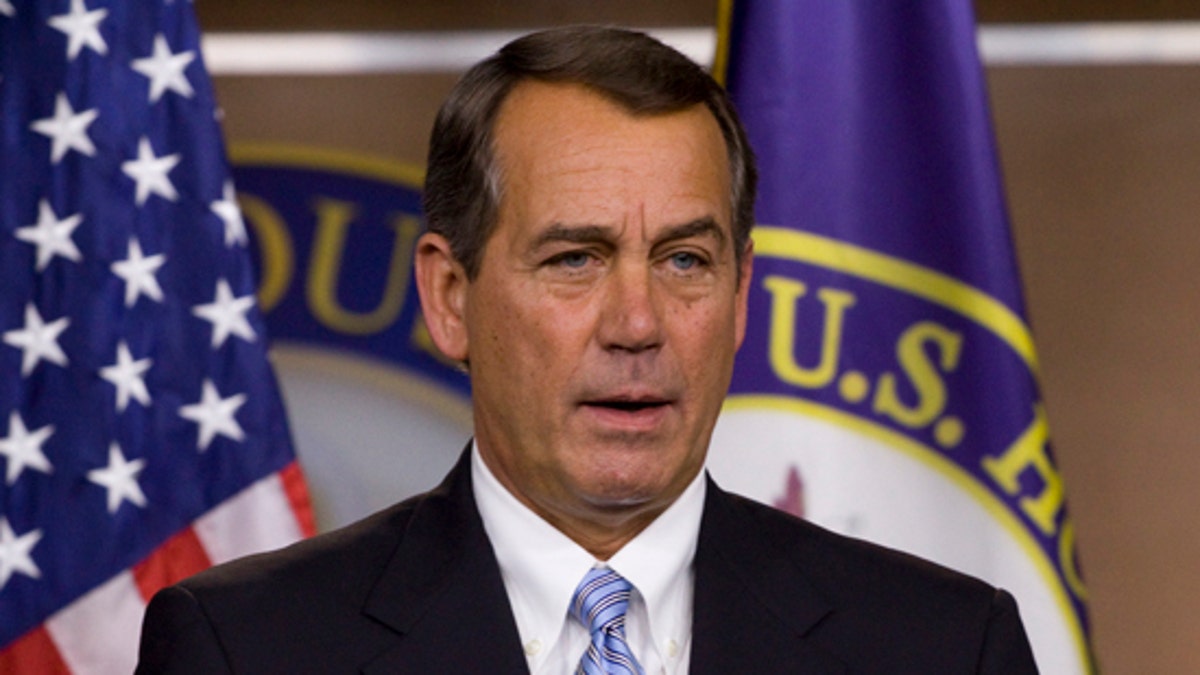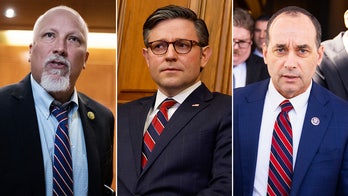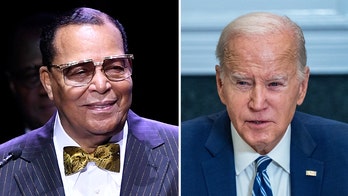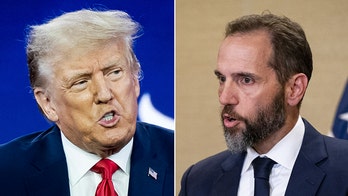
House Minority Leader John Boehner of Ohio speaks at a news conference on Capitol Hill in Washington, Thursday, March 25, 2010. (AP)
Come 2014, all 100 U.S. senators, all 435 representatives in the House and every one of their personal aides will have to go to the newly formed state exchanges for health insurance -- just like everyone else in the country who isn't covered by their employer.
But select congressional leadership staffers -- some of whom wrote the health insurance act -- won't. And neither will White House staffers and Cabinet members -- nor the president himself. They will be allowed to keep their current plans, which are offered to all other federal employees.
And now many congressional aides who like their current health insurance policies and will be forced to switch are asking: Why?
They want to know: If an exchange is good enough for them, why isn't it good enough for the people who wrote the plan? Why isn't it good enough for the president and his Cabinet?
Mass e-mails have been circulating among congressional aides on both sides of the aisle as they voice their objections to what they are calling a double standard in the health care law President Obama signed on Tuesday.
"If it's such a good bill, why did the people who wrote the bill exempt themselves from it?" asked a Republican aide who requested anonymity. "With this administration it's always, 'Do as I say, not as I do,' just like paying your taxes!"
"If we're forced on the exchange, then everyone should be," a Democratic staffer said.
"If this health care bill is so great, then why are Obama's staff exempt?" a GOP aide scoffed. "If we have to give up our health care, then so should every federal employee."
Members of Congress and their staffers currently select their health insurance plan from the pool of health care policy options that are available to all federal employees. But under the new law, unlike other federal employees, they will be required to purchase their insurance from the state-run exchanges when that part of the law goes into effect in 2014.
But the provision appears to exclude leadership and committee staff, giving the appearance that those who wrote the bill wrote themselves out of this requirement.
The White House is also exempt from moving from the current federal employee plan to state-run exchanges, although the White House said Wednesday that Obama will participate in the exchanges if he is still president in 2014.
It remains unclear why the law was written this way. Efforts to understand the reasoning behind the carving out of leadership staff from this part of the new law were unsuccessful. Phone and e-mail requests for comment from the committees involved in the drafting of the Senate bill were either directed elsewhere or not returned.
A Congressional Research Service report stated that the definition of the law as it stands now would likely be interpreted as applying only to congressional members' personal staff, and exempting both leadership and committee staff.
The definition of "congressional staff," according to the CRS report, could be interpreted narrowly to refer only to staff members directly affiliated with a member's individual or personal office. As an example, that would mean that staffers who work with House Speaker Nancy Pelosi's constituents out of her California office would be classified as "congressional staffers" and have to switch over to the exchanges -- but the staffers who work in association with her role as speaker of the House would be allowed to keep their current policies.
It is still unclear if congressional offices will get subsidies to pay for their employees or if staffers with income below the pay threshold will get subsidies to buy insurance for themselves. Calls to about a dozen different offices yielded the same response: No one seems to know yet exactly how to interpret the law.
A spokesman for Senate Majority Leader Harry Reid acknowledged that some committee staffers are exempt, but said leadership staff will have to buy into the exchanges like other Capitol Hill employees.
But Sen. Chuck Grassley, R-Iowa, said he believes the current wording means that committee and leadership staff in Congress, as well as the president, vice president, the Cabinet and White House staff, will continue to access the Federal Employees Health Benefit Program, while all other congressional staffers will have to find their insurance policies on the exchange.
A Democratic aide said he thought it would be difficult enough under the new law to figure out how to navigate his insurance, but he wouldn't mind as much if everyone else had to do the same.
"It appears that some of my colleagues will not have to make these changes, which is annoying to say the least," he said.
"The president continues to say if you like the health care coverage you have, you can keep it, and it's simply not true," said Michael Steel, spokesman for House Minority Leader John Boehner. "This is just one example of the bad consequences of this law."
"Large parts of this bill were thrown together hastily and behind closed doors, I'm afraid this is not going to be the only surprise going forward," he said.
Grassley and Sen. Tom Coburn, R-Okla., are heading the charge to introduce legislation that would require all federal employees to have the same health care requirements and options. Both made efforts to close this loophole last year, but the Senate rejected Grassley's amendment in December.
"If this amendment isn't passed, then President Obama will not live under the Obama health care reforms, and neither will the congressional staff who were most responsible for helping to write the overhaul," Grassley said in a statement to FoxNews.com on Wednesday. "That sends a message to the people at the grassroots that the health reforms are good enough for you, but not for us."
But a spokesman for Reid said Coburn's objection to the law was disingenuous, charging that Coburn himself had created the "two-tiered" status.
"In his rush to make political statements instead of policy achievements, Senator Coburn clearly wasn't paying attention to what he was doing," Jim Manley said.
"The amendment that created this committee and personal office distinction was authored by Senator Coburn. It's WORD for WORD what Coburn proposed in Committee.
"If he wonders why committee staff aren't in the exchange, perhaps he should ask himself," Manley said. "Senator Coburn's newest complaints on health reform are too little, too late."
But Coburn said Reid's spokesman has it all wrong.
"This special deal for unelected staff underscores everything the public detests about the arrogance of power in Washington," he said. "I tried to fix this inequity along with Senators Grassley, Burr and Vitter, but Majority Leader Reid obstructed our effort."




